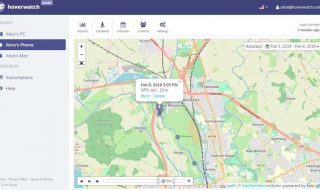
Nowadays, more and more companies are going through a digital transformation. You’d be surprised just how many companies haven’t done so, even though you can’t really imagine a company that doesn’t rely on technology completely and doesn’t operate online to the fullest.
However, undergoing a digital transformation means facing numerous challenges and obstacles. Even companies that are already well-established in the online market aren’t immune to similar issues.
The biggest challenge is leveraging the talent in your company and the information each department can acquire.

Companies need to make informed decisions in order to develop further and overcome market challenges. Unfortunately, they cannot do that if they cannot handle or process information the right way. A simple and effective solution always presents itself when you need it the most.
In this case, the solution is a digital information hub. This is arguably the only way forward for companies to be able to face the ever-growing market demands.
With that in mind, let’s have a closer look at what a digital information hub is and why you might need it.
Holding information within a silo

It’s no secret that many companies struggle to compete in the online market because of their poor handling of the information within the company itself. The point, in fact, is that companies withhold information within the so-called silos.
Only top-level executives have access to all of the information. Moreover, they won’t allow information to be freely shared between employees or departments. This causes bottlenecks that are inconvenient and unnecessary.
Employees cannot be productive or efficient, for that matter, if they have to request and wait for access to information all the time. For example, your sales department can’t do its job well without customer information your marketing department has.

Suppose your sales representative has to put a potential customer on hold so that they can contact the marketing department and request information about the consumer. In that case, the lead will go cold a hundred times over by the time that’s done.
Company owners don’t realize this is a serious issue until they start falling behind their competitors. Fortunately, there’s always a solution, and a digital information hub is an ideal example of how to approach such an issue.
What exactly is a digital information hub?

When information silos are broken down and information can freely be accessed by employees across various departments, more strategic and more viable strategies can be made. Such strategies can drive a business forward and secure advantages when they are needed the most.
However, information has to be handled and analyzed properly. Otherwise, things may become quite chaotic pretty soon.
Reliable information management for business is quite necessary for such situations. Therefore, a digital information hub represents a centralized solution to store and organize information, data, files and other relevant assets.
From this centralized location, employees can seamlessly and quickly access the information they need to do their job efficiently. Such hubs promote cross-department collaboration and communication. The main purpose is to help companies create more effective strategies by sharing information rather than adapting to circumstances on the spur of the moment.
Furthermore, a digital information hub encompasses various tools that help departments work together towards achieving common company goals. It’s a hybrid of information and technology that can process data in real-time and provide useful insights that will help the organization develop further.
Do you need an information hub?

Chances are that your organization really needs a digital information hub. But why is that? Simply put, an information hub combines all the technologies and the data your company uses and centralizes everything.
It creates a unified solution where you can use all the tools and information in one place.
Aside from its practical use, a digital information hub processes all the inbound information your company collects from marketing, advertising and other efforts. It then analyzes all that information and provides useful insights and data analytics.
Moreover, if you have remote offices across the globe, they can all access the same information and tools from your hub in real-time. That said, an information hub basically facilitates all company efforts and lets you integrate multiple processes using state-of-the-art technology for visualization. This creates a unique opportunity to utilize the full potential of all of your employees and departments.
In fact, they can share ideas and information about how to overcome challenges and obstacles that the company will inevitably face. It’s safe to say that you’re creating a single cross-functional department with the help of your digital information hub instead of relying on multiple departments that operate individually.
How to set up a digital information hub?

A digital hub is basically a large command center equipped with technology that will allow you to centralize all processes into a single location. Therefore, you should assign a large enough room for it at your office or choose a remote location for your hub.
However, a lot of companies prefer to create a digital workspace with the hub in the center of it all. That way, everyone can see and access the hub when needed. The room itself needs proper infrastructure to house hardware and people who will operate the hub.
That’s why it’s vital to plan well ahead on how to implement the hub, not just decide to do so overnight. To help you set everything up, here are a few things you should consider.
- How much computing power is required to run the hub? – This depends on the size of your company and the data you collect.
- How many employees are needed to operate the hub? – Someone has to keep an eye on things and monitor the data. Moreover, you need support and maintenance staff that can work on hardware if something goes wrong.
- What type of data should be measured and available? – Information is visually displayed on multiple monitors at the hub. You have to decide which data is displayed so that everyone can keep an eye on it.
- How can people interact with the hub? – Employees must be able to access information that the hub processes. Will they come in and manually manipulate the data, or can they do it remotely?
The importance of having a digital information hub

Information hubs play a significant role in how a company develops and grows further.
The online market is already highly competitive and overcrowded. That said, companies need more consumer-centric and straightforward approaches to tackle the growing number of challenges that emerge in the online market.
An information hub unifies a company as a whole and puts everyone together to help accomplish the goals and milestones, as well as ensure that the company maintains its relevance and competitiveness in the market.
The fact of the matter is that departments need to work together so that they can actually meet, if not even exceed, growing consumer expectations and demands. The only way they can achieve complete collaboration and efficiency is through an information hub that allows seamless information sharing and access to relevant and actionable business data.
A digital information hub is an innovation everyone has been waiting for. The way to make data and information flow freely company-wide is simply a must nowadays.
If you continue to hold information within a silo due to some silly company policy, your company will soon fall behind and lose any opportunity for success in the online market.




